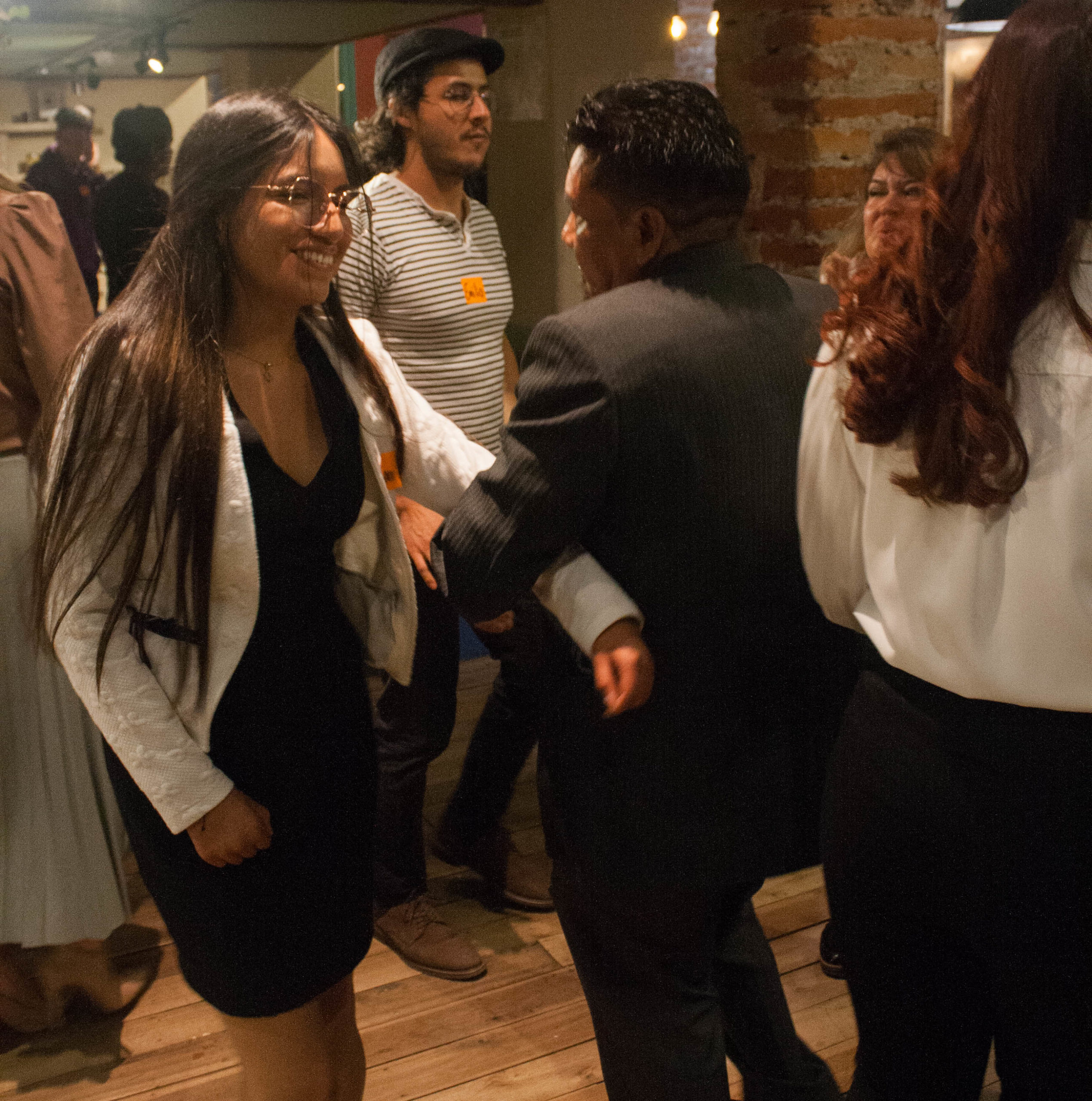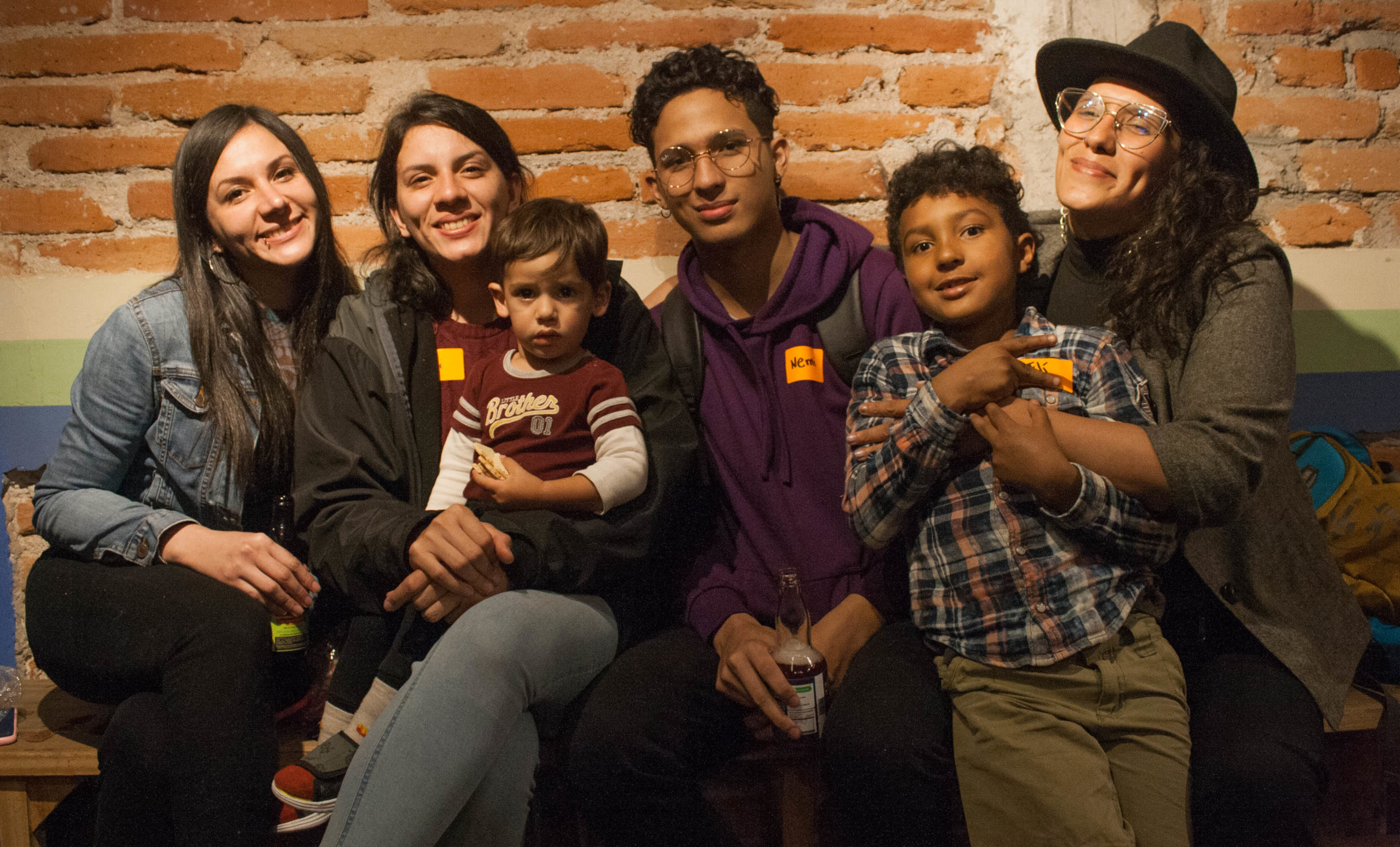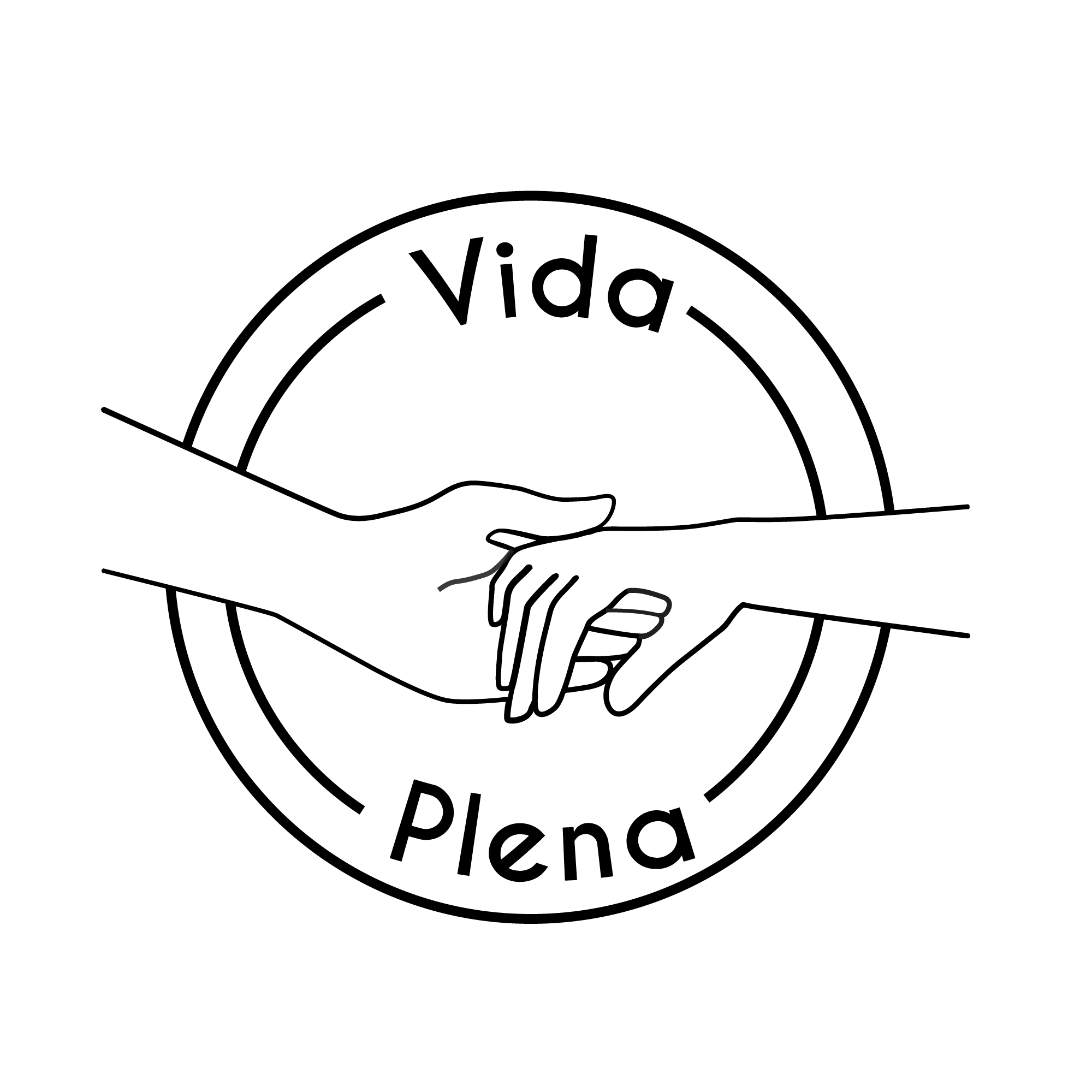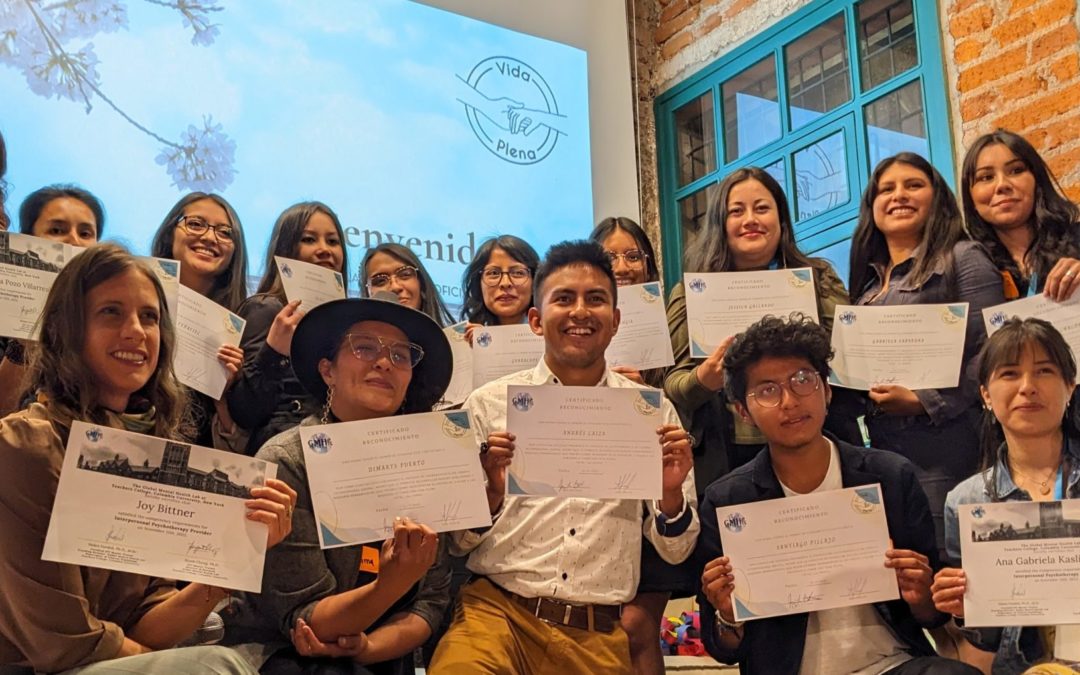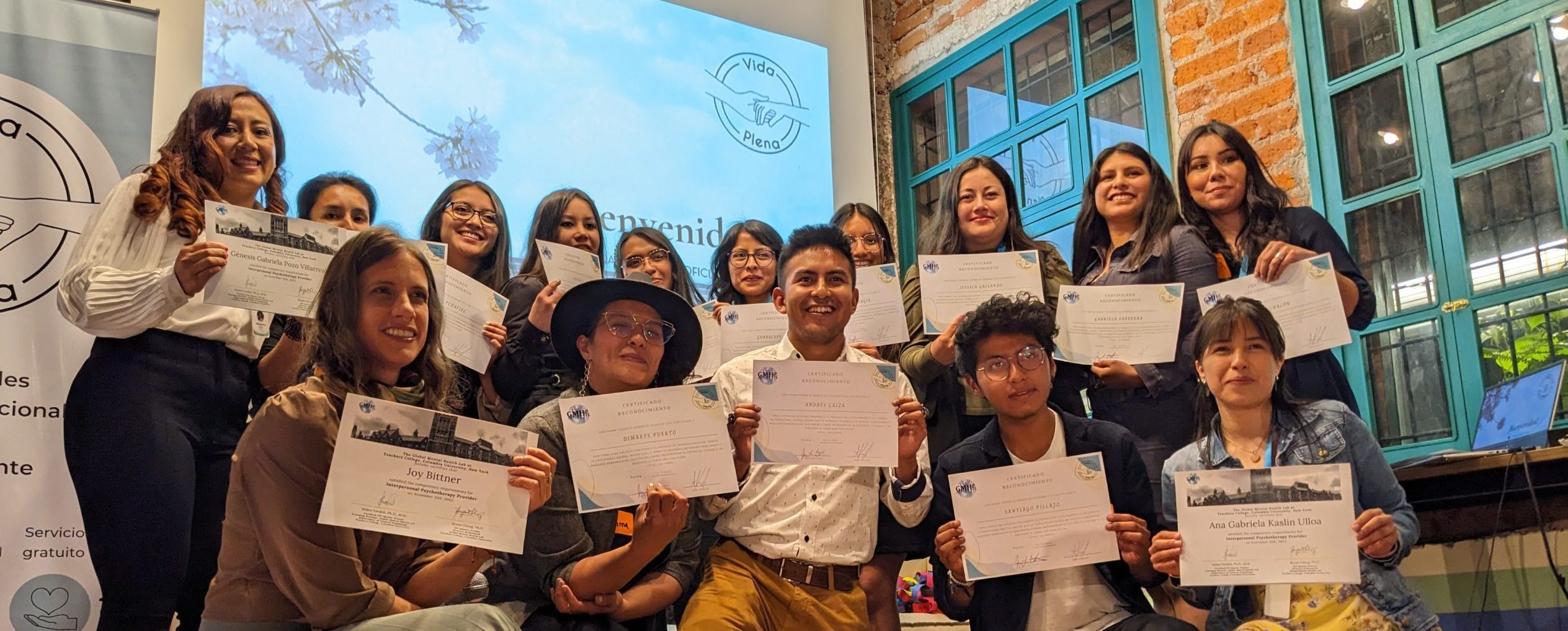
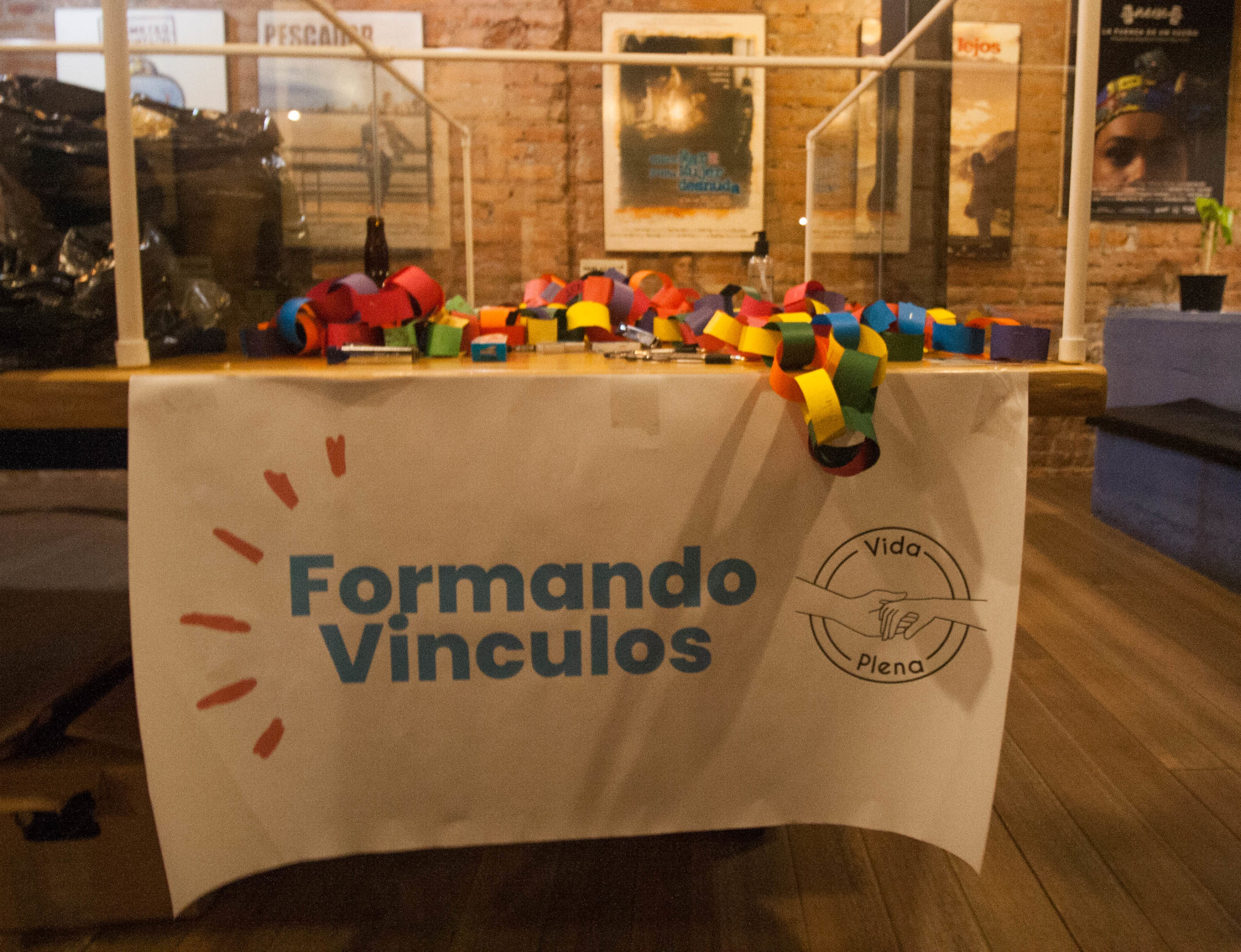
Can’t believe we’ve just closed out the year….And what year it’s been. I occasionally keep a journal, and last year’s January 1 entry read, “Ok, I think this is the year to really make this happen.” But in that moment there still wasn’t anything yet – a single dollar in the bank, a single person trained, a single person taking part in a group.
But just before Christmas, we passed the milestone of completing our pilot. So, with the team in Quito, we celebrated this moment to recognize the incredible accomplishments of the past months. We drank hot cañalazos, danced to a traditional Quiteño brass band, and awarded certificates for the hard work of the 12 facilitators who passed the Columbia University Interpersonal Therapy exam.
I’ll be sending you the data and results of the pilot in the coming weeks, but for the moment I want to share the message I gave to that incredible group of facilitators, their families and friends, and so many supporters, like yourself, who have made all this possible.
What I really hope to do is convey the very human story of why we are doing all this, and the grand vision of the future we are working to create.
The theme of the night was community and connection. So, as we are close out this exceptional past year, I want to thank you for being such a key part of our community. I mean it literally when I say that this would not have happened without you.
Wishing you a new year full of wonder and love,

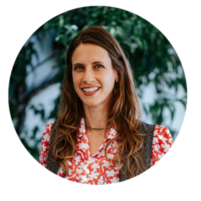
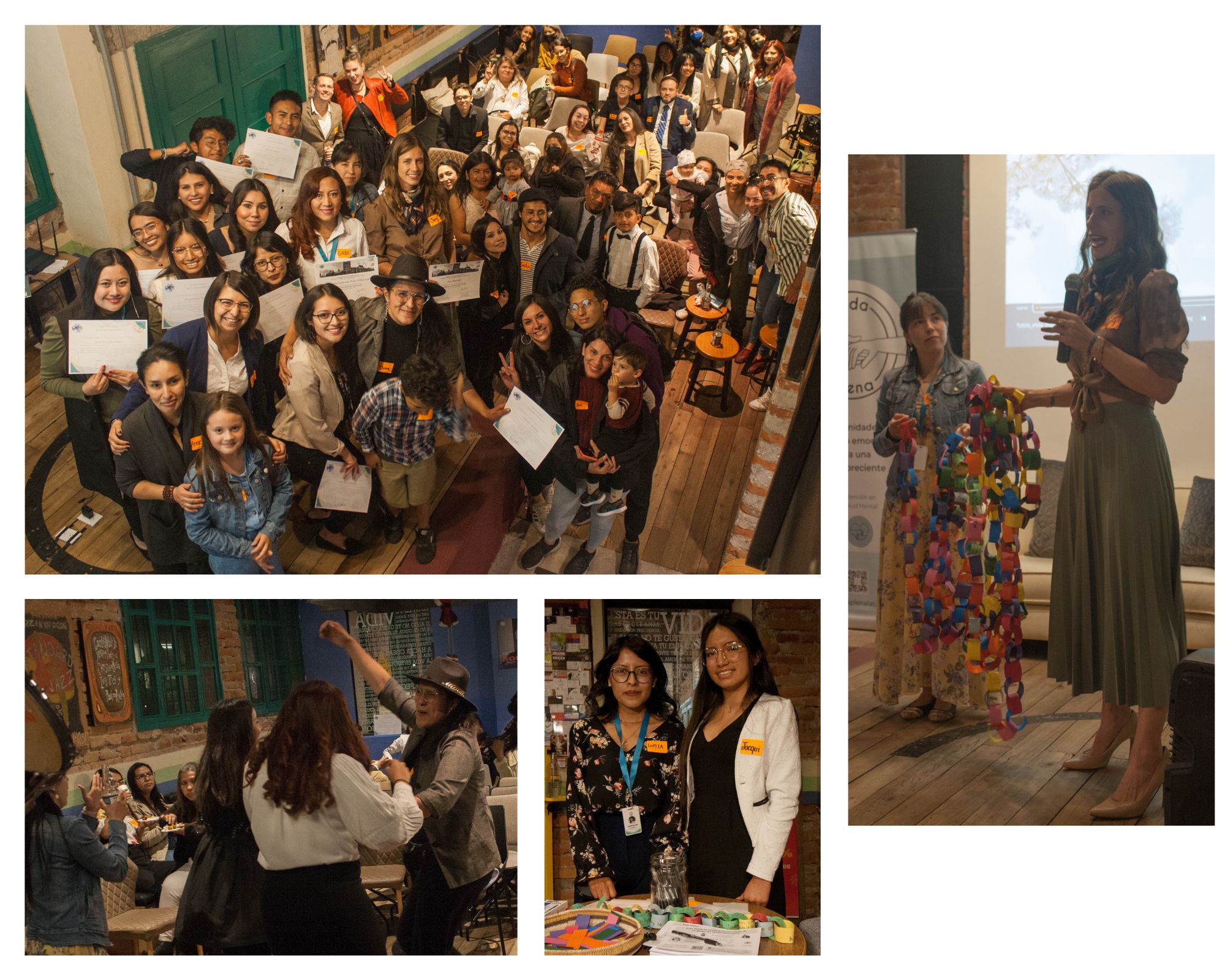
First, I want to share a bit of the story of how Vida Plena started. Ten years ago, I came to Ecuador to lead a fair-trade company that works with indigenous artisans. We made handmade jewelry – so that means hours upon hours sitting around kitchen tables, stringing beads. Lots of time to share stories of life, our trials and our joys.
One woman, “Maria,” tragically lost her husband to suicide, leaving her alone with four kids and a lot of serious problems. We gave her a job, hoping that would fix things, but as you know, money helps, but doesn’t solve everything. I tried to get her connected to a psychologist, but (as we all know), it’s hard to find mental health care in Ecuador. Because of costs and distances and all sorts of other issues, I couldn’t make it happen. That planted one of the first seeds for Vida Plena.
However, what Maria did have was an incredible community – all the other artisan woman. They would frequently say how they loved to leave behind the daily stresses of their homes to go to the workshop, where they would chat, gossip, and laugh. That planted another seed, seeing the power of a supportive community.
It’s ironic where inspiration can come from, but the final seed for Vida Plena came from a facebook post. Yes, facebook. Someone had shared a post about an organization in Africa, and what I found so incredible about it was the story about how they had trained local community members, the grandmothers, to be able to provide mental health care in their own communities. And the most incredible part was, they had a huge number of studies from academics in the US and England, proving that it worked. The data showed that those grandmothers – sitting on benches, under trees, in the open air – were able to provide highly effective treatment for depression. And this is what we are doing here too, putting mental health into the hands of local people in their own communities. Because mental health problems are community problems.
Where does depression come from? It has many causes, but it’s often problems like migrating and losing your family ties. or losing a job, or losing a child, and these are community problems that need to be solved in the community. This is what we are doing, we are taking mental health care out of the clinics, out of the sterile hospitals, the distant professionals in white lab coats- and while there is a place for that at times – we are transforming mental health by bringing it back to the local communities, to local people, like yourself, who know and understand the issues because you too have walked these rocky paths.
Tonight, we are here to celebrate all that you have accomplished, we’re finishing the pilot and it’s been an incredible journey, but I don’t want to pretend it’s been all easy and smooth. There have been hard moments as well. One example of that –back in June when we first got going, we did some surveys with the beneficiaries of our local partner, Ala’s de Colibri, just to understand a bit more of the context of the people we would be working with. Basic questions about if evenings or mornings would better, how far people lived from their office, and if we would need to figure out childcare. Nothing about their mental health.
But one of the first woman I spoke to that day, simply upon hearing that it was a mental health program abruptly told me “I tried to commit suicide 3 days ago.” I was in shock, not expecting that revelation in that moment. But we had just completed the Columbia suicide training literally two days before, so suddenly it was time to put the theory into practice: It was time to pull myself together and go through the checklist of the steps – ask follow-up questions, create a safety plan, ensure she had to right connections to get further help. I gave her my number, and we’re still in touch today. But when she left, I went to the bathroom and looked at myself in the mirror and asked myself, “Are you really ready for this, Joy?? Are you sure you can handle this???” Because this isn’t a game, these are real people’s lives we’re dealing with, and there are real consequences. And like this woman, there are thousands of others.
In the pilot alone we’ve had a number of cases much like this – Lupita, Kari, Dima, Sol – I know you have all had to deal with similar moments of crisis. It’s not been easy. And we will continue to face challenges, but we will also continue to be a light for people in their darkest moments.
Depression has real consequences. Public health experts say that the effects on physical health of untreated depression is the same as smoking 15 cigarettes a day. This is a huge cost to someone’s physical health – never mind the cost to the public health system, the cost to employers, and especially the cost to families. Because depression means that a teacher can’t go the extra bit for their student, a friend quietly disappears, a mom can’t care for her kids. The effects of depression don’t just stay with that one person, it ripples outwards, having ever-expanding impacts on all levels of society.
But we have ways to get people help. Help which has the evidence to prove it works. This evidence base is one of the fundamental values of Vida Plena, to always provide treatment that is proven. There is nothing worse than giving people false hope, especially to a person dealing with mental health issues. While we can’t make promises, we will be as certain as possible that this program will help the majority of people who come through our doors.
So where are we now? We have 16 people – the first in Ecuador – who have been certified by Columbia University in Interpersonal Therapy. Then, despite the fact that Vida Plena support groups were new, and unknown, we still had over 200 people register to be part of a group, showing that people are looking for this type of help. We have 10 support groups running across the city, from the far north of Cotocaollo to the far south in Guayamin.
And it’s making a difference. Anita reviewed the initial data just today and found that the average person started with scores of moderate -severe depression symptoms, and as of today – and we havent even finished the full program yet – the average person now has only mild depression symptoms. This is an incredible change, and they havent even finished the full program. The organization we are replicating in Africa reports that 85% of people who go through their program recover from depression, and we expect to do the same or better.
This coming year our goal is to reach 2,500 people. Its hard for our brains to put a face to 2,500 people so I want to share with you some real stories of people who we have already helped.
One is a refugee woman who had struggled to find work, but through the support and encouragement of her group, she was able to follow her dream of launching her own business.
Another person who joined Vida Plena started out too anxious to even go to the corner store, but slowly with our help she was able to make one friend, and this one friend gave her the confidence to face the problems in her co-dependent relationship and have the security to accept its eventually end.
One final story of another woman from Tulcán: 15 years ago, she had an unwanted pregnancy. She had the baby, and although she had fulfilled her responsibilities to raise her daughter, making sure she had food, got to school, but it was almost impossible for her to show her daughter any type of affection. But after processing and role playing with her group, she was finally able to go home and give her daughter a real hug. These are the life transformations that are happening over and over.
A few minutes ago, we asked each of you to name a person who was there for you in a time of need. This is the heart of Vida Plena, people reaching out to another, building networks of care and support. a movement of people coming together in community. Because again, this we are doing: breaking down the barriers to mental health, bringing it back to the local communities – to the community centers, the local churches, to the places where people actually work and live. Making sure that people who otherwise couldn’t get help, have not just one, but a whole community of people supporting one another.
And this is the grand vision. That people first come to a Vida Plena group hurting and only to get help for themselves. But slowly over the weeks, they continue going to support their fellow group members. And then– this is what really happens – then as their healing continues, they say “this is remarkable, I want to become a group facilitator.” Which is wonderful, but not the end goal of what we want. We’re not hoping to create an army of Vida Plena facilitators, but rather our vision is for people to go back to their communities, with the support of their group to tackle other problems that they see, to be the catalysis bringing about incredible amounts of change. Weaving a web of communities supporting communities, a constant wave of transformation, ever extending outwards.
And I know that this can happen, because only a year ago Vida Plena didn’t exist. We didn’t have a single dollar, a single facilitator, a single group – it was just an idea on digital paper. And look where we are now. Thanks to the incredible work and support of so, so many people, and especially all of you who are here today. I know that by the simple fact you are here tonight means that you also believe in this vision and share these same values.
This event isn’t a fundraiser, I’m not going to pass the hat and ask for donations. But I am going to ask to that you repay us this way: Right now, I want you to think of someone you know- maybe your neighbor, or a coworker, or that cousin you havent spoken to in forever, someone you know who is struggling. You have that person in mind? Now I want to you commit to reaching out to them, either telling them about a Vida Plena support group, or being that person yourself, that person who is there for them, to listen, to show you care, to be that support they need.
Imagine if we do that, we’re some 80 – 100 people here? That means we can reach 100 people, and then they reach out to 100 more and it becomes an ever-extending tidal wave of connections, little moments that make all the difference. And this is Vida Plena. Because a Dima always says, ‘by giving we receive.’ Which is why the name ‘Vida Plena’, the aim isn’t just to treat depression, but to make it possible that people are not just surviving in the day-to-day rat race but are actually thriving. That each person can have a life which is truly full and flourishing. Thank you for making this happen.
